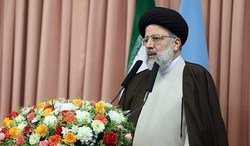 Iran’s Judiciary Chief Ayatollah Seyed Ebrahim Rayeesi pointed to the need to increase the country’s power in biological defense.
Iran’s Judiciary Chief Ayatollah Seyed Ebrahim Rayeesi pointed to the need to increase the country’s power in biological defense. RNA - “Boosting biological power is necessary given the current situation,” Rayeesi said on Monday in a meeting with top officials of the Judiciary Branch.
Rayeesi also praised the decision to free near 84,000 prisoners as a precaution to the outbreak.
His remarks come as some believe the COVID-19 outbreak in the country can be a form of biological warfare against countries such as Iran and China.
Supreme Leader of the Islamic Revolution Ayatollah Seyed Ali Khamenei ordered the Armed Forces to establish a special base to fight the outbreak in the country on Thursday. “Since there is speculation that this incident might be a ‘biological attack’, this measure could be also some form of biological defense drill, which would add to national power and strength,” the leader said.
Also, Head of Iran's Passive Defense Organization Brigadier General Gholamreza Jalali said last week that “Although one cannot say for sure that is a biological war, in fact, it has many features of a biological war,” while noting that further investigation is needed.
Meanwhile, the Iranian Army has started nationwide biological defense drills to increase readiness and boost efforts to contain the disease.
Iran's Health Ministry announced on Monday that the number of people infected with COVID-19 virus has grown to 14,991, while death toll has increased to 853.
Novel coronavirus, or COVID-19, is a new respiratory disease first identified in the central Chinese city of Wuhan late last year. The World Health Organization on Wednesday described the outbreak as a pandemic.
According to the latest reports, the novel coronavirus, officially known as COVID-19, has infected over 171,000 people in the world, claiming more than 6,500 lives.
Last Wednesday, the Iranian foreign ministry declared that despite Washington’s claims of cooperation to transfer drugs to Iran via the new Swiss-launched payment mechanism, the US is troubling the process amid the coronavirus outbreak in the country.
Although US claims that medicines and medical equipment are not under sanctions, they have practically blocked the transfer of Iran’s financial resources in other countries into the Swiss Humanitarian Trade Arrangement (SHTA), Iranian Foreign Ministry Spokesman Seyed Abbas Mousavi said.
As the death toll from the virus surges, Iran intensifies its preventive safety measures. Closures of schools and universities have been extended for the next two weeks.
The government also imposed travel restrictions, specially on Iran’s north, which is among the red zones. The country has also adopted strict digital health control procedures at airports to spot possible infections.
Health Minister Saeed Namaki announced earlier this month that a new national mobilization plan would be implemented across the country to fight against the coronavirus epidemic and more effectively treat patients.
Namaki said that the plan will include all the 17,000 health centers and the 9,000 medical and clinical centers in all cities, suburban areas and villages.
He added that the plan will include home quarantine, noting that infected people will receive the necessary medicines and advice, but they are asked to stay at home.
Namaki said that people with a more serious condition will stay at the hospitals, adding that the public places will be disinfected, the entries of infected towns and cities will be controlled to diagnose and quarantine the infected cases.
He added that the necessary equipment and facilities have been provided, expressing the hope that the epidemic would be curbed.
Namaki said that the number of medical laboratories to test coronavirus infection has reached 22, and will increase to 40 soon.
The World Health Organization (WHO) says Iran's response to the virus has so far been up to the mark. Still, it says the US sanctions are a big challenge, and Washington would be complicit in the rising death toll in Iran if it would not remove its sanctions.
The World Health Organization has considered priorities in combating coronavirus and Islamic Republic of Iran obeys and follows up priorities as defined by WHO.
The WHO is dispatching separate delegations to all countries.
847/940